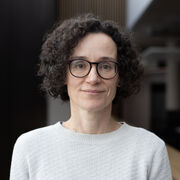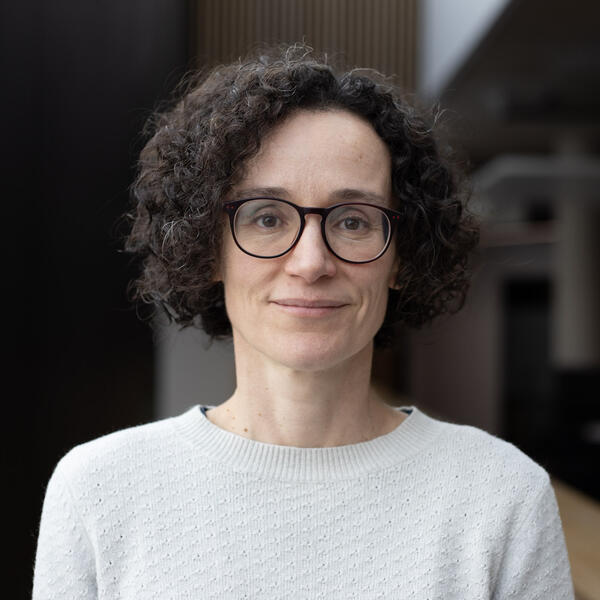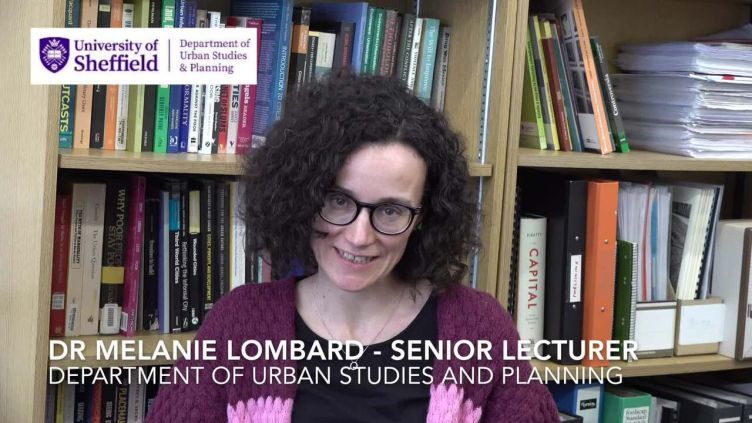Dr Melanie Lombard
School of Geography and Planning
Senior Lecturer


Full contact details
School of Geography and Planning
Room D26
Geography and Planning Building
Winter Street
Sheffield
S3 7ND
- Profile
-
Dr Melanie Lombard is a Senior Lecturer in Urban Studies and Planning at the University of Sheffield. Her research agenda involves connecting the built environment (with a particular focus on housing-related issues) to social processes through exploring the everyday activities that construct cities, often neglected by formal theories and practices of planning and urbanism. She is particularly interested in urban informality, and urban land and conflict processes.
She has explored these themes in cities in Mexico, Colombia, and the UK, working with institutional partners including the Universidad Veracruzana in Mexico, and the Universidad Javeriana in Colombia. She is involved in current research funded by the Global Challenges Research Fund comparing urbanisation and migration processes in Ethiopia, Uganda and Nigeria.
Before moving to the University of Sheffield in 2016, she taught at the University of Manchester’s Global Development Institute/Global Urban Research Centre (2010-2016). Her previous professional experience includes working in the UK social housing sector.
She has published articles in journals including Urban Studies, Progress in Planning, Environment and Planning D: Society and Space, and the International Journal of Urban and Regional Research. She is a Trustee of CLASS (Community Led Action and Savings Support), a charity supporting the Manchester-based Community Savers network.
- Research interests
-
My research agenda explores how the built environment (particularly housing and shelter related aspects) is connected to and can be understood through exploring residents’ and others’ everyday constructive activities, often neglected by formal urban theories and practices; and the implications of this for urban policy.
Within this broad agenda, my research has focused on two core areas: urban informality, and land conflict in cities.
Urban informality
This theme aims to examine different manifestations of informality in rapidly changing, diverse urban settings in support of formulating more appropriate responses, focusing on cities in Mexico, Colombia and the UK.
Building on research in informal settlements in Colombia and Mexico, more recently I have become interested in comparing informal housing practices across the global North and South, particularly in the context of austerity in Europe, and community-based organisations’ responses to neighbourhood-level issues.
Land conflict in cities
The second area of my research explores the political economy of urban land conflict in cities of the global South, through a focus on causal factors, local vulnerabilities and policy responses.
Previous research has focused on small-scale conflict that arises relating to land policies including tenure regularisation and agrarian reform in Mexico, and territorial issues in post-conflict Colombia. My current research explores the nexus between land, urbanisation, migration and conflict in cities in Ethiopia, Uganda and Nigeria.
Research projects
- ‘Designing Publics’ Research Network (AHRC Research Networking Fund)
- Migration, Urbanisation and Conflict in Africa (MUCA): Building Peaceful Urban Futures (ARUA-UKRI GCRF Partnership Programme for Capacity Building)
- Urban citizenship and informality network (White Rose DTP Network funding)
- From contested territories to alternatives of development (European Commission Horizon 2020/Research and Innovation Staff Exchange (RISE))
- Contested Territories: Interdisciplinary dialogues on conflict, resistance and development alternatives in Latin America (White Rose Collaboration Fund)
- Improbable dialogues: participatory research as a strategy for reconciliation (Newton RCUK-Colciensas)
- Publications
-
Books
- Urban Informality: An Introduction. Bristol University Press.


- Participating in peace: violence, development and dialogue in Colombia. Bristol University Press. View this article in WRRO


Journal articles
- Everyday urban peace: Experiences from a marginalised neighbourhood in Cali, Colombia. Environment and Planning C: Politics and Space. View this article in WRRO


- Hybridising governance for resilience in a time of crisis: learning from community-based organisations in Cape Town and Cali. International Development Planning Review, 47(1), 41-63. View this article in WRRO


- Entangled rationalities: planning responses to informal housing practices within middle-income neighbourhoods in Nairobi City, Kenya. Planning Theory & Practice, 25(3), 299-320. View this article in WRRO


- Framing urban threats: a socio-spatial analysis of urban securitisation in Latin America and the Caribbean. Urban Studies, 60(14), 2741-2762. View this article in WRRO


- Beyond displacement: territorialization in the port city of Buenaventura, Colombia. Territory, Politics, Governance, 11(7), 1324-1343. View this article in WRRO


- The experience of precarity: low-paid economic migrants’ housing in Manchester. Housing Studies, 38(2), 307-326.


- Informal rental housing in Colombia: an essential option for low-income households. International Development Planning Review, 43(2), 257-277. View this article in WRRO


- Between pacification and dialogue: Critical lessons from Colombia’s territorial peace. Geoforum, 118, 106-116.


- Informality as structure or agency? Exploring shed housing in the UK as informal practice. International Journal of Urban and Regional Research, 43(3), 569-575. View this article in WRRO


- Urban informality as a site of critical analysis. Journal of Development Studies, 56(2), 223-238. View this article in WRRO


- Interrogating informality: Conceptualisations, practices and policies in the light of the New Urban Agenda. Habitat International, 75, 59-66. View this article in WRRO


- Land conflict in peri-urban areas: Exploring the effects of land reform on informal settlement in Mexico. Urban Studies, 53(13), 2700-2720. View this article in WRRO


- Urban land conflict in the Global South: Towards an analytical framework. Urban Studies, 53(13), 2683-2699.


- Discursive Constructions of Low‐income Neighbourhoods. Geography Compass, 9(12), 648-659.


- Place-Making and construction of informal settlements in Mexico. Revista Invi, 30(83), 117-146.


- Constructing ordinary places: Place-making in urban informal settlements in Mexico. Progress in Planning, 94, 1-53. View this article in WRRO


- Rolando Cordera, Patricia Ramírez Kuri and Alicia Ziccardi (eds), Pobreza, desigualdad y exclusión social en la ciudad del siglo XXI (Mexico City: Siglo XXI, 2009), pp. x+438, pb.. Journal of Latin American Studies, 45(4), 846-848.


- Struggling, Suffering, Hoping, Waiting: Perceptions of Temporality in Two Informal Neighbourhoods in Mexico. Environment and Planning D: Society and Space, 31(5), 813-829.


- Citizen Participation in Urban Governance in the Context of Democratization: Evidence from Low‐Income Neighbourhoods in
M exico. International Journal of Urban and Regional Research, 37(1), 135-150.

- Using auto‐photography to understand place: reflections from research in urban informal settlements in Mexico. Area, 45(1), 23-32.


- Insurgent planning in informal settlements: A case study from Cali, Colombia. Cuadernos De Vivienda Y Urbanismo, 5(10), 246-260.


- Informality, the Commons and the Paradoxes for Planning: Concepts and Debates for Informality and Planning Self-Made Cities: Ordinary Informality? The Reordering of a Romany Neighbourhood The Land Formalisation Process and the Peri-Urban Zone of Dar es Salaam, Tanzania Street Vendors and Planning in Indonesian Cities Informal Urbanism in the USA: New Challenges for Theory and Practice Engaging with Citizenship and Urban Struggle Through an Informality Lens. Planning Theory & Practice, 12(1), 115-153.


- Book reviews. Planning Perspectives, 26(1), 119-150.


- Lugarización y la construcción de asentamientos informales en México. Revista INVI, 30(83), 117-146.


- More than just translation: challenges and opportunities in translingual research. Social Geography, 4(1), 39-46.


- More than just translation: challenges and opportunities in intercultural and multilingual research. Social Geography Discussions, 5(1), 51-70.


Book chapters
- Working Informally, Urban Informality (pp. 67-88). Bristol University Press


- Understanding Urban Informality, Urban Informality (pp. 23-44). Bristol University Press


- Responses to Working Informally, Urban Informality (pp. 135-154). Bristol University Press


- Responses to Living Informally, Urban Informality (pp. 111-134). Bristol University Press


- Living Informally, Urban Informality (pp. 45-66). Bristol University Press


- List of Figures, Tables and Boxes, Urban Informality (pp. vii-ix). Bristol University Press


- Introduction: The Global Significance of Urban Informality, Urban Informality (pp. 1-22). Bristol University Press


- Governing Informally, Urban Informality (pp. 89-110). Bristol University Press


- Emerging Alternatives, Urban Informality (pp. 155-182). Bristol University Press


- Conclusion: For Trans-Local, Multi-Voice Understandings of Urban Informality, Urban Informality (pp. 183-192). Bristol University Press


- Transforming Buenaventura: Dialogue for Municipal Peacebuilding, Participating in Peace (pp. 83-116). Bristol University Press


- Peace through Participation: The Colombian Experience, Participating in Peace (pp. 11-35). Bristol University Press


- Participation through Dialogue: Co-Producing Peace and Research, Participating in Peace (pp. 36-56). Bristol University Press


- Introduction, Participating in Peace (pp. 1-10). Bristol University Press


- Transforming Buenaventura: Dialogue for Municipal Peacebuilding, Participating in Peace (pp. 83-116). Policy Press


- Notes on the Authors, Participating in Peace (pp. vii-viii). Policy Press


- Note on the Cover Image, Participating in Peace (pp. xi-xii). Policy Press


- List of Maps and Tables, Participating in Peace (pp. iv-iv). Policy Press


- List of Abbreviations, Participating in Peace (pp. v-vi). Policy Press


- Participation through Dialogue: Co-Producing Peace and Research, Participating in Peace (pp. 36-56). Policy Press


- Peace through Participation: The Colombian Experience, Participating in Peace (pp. 11-35). Policy Press


- Protecting Catatumbo: Dialogue as Conflict-Sensitive Environmentalism, Participating in Peace (pp. 57-82). Policy Press


- Introduction, Participating in Peace (pp. 1-10). Policy Press


- Informal settlements, The Routledge Handbook of Latin American Development (pp. 528-538). Routledge


- Informality and place-making in the city, Xalapa, Mexico In Becerra A & Hernandez F (Ed.), Marginal Urbanisms: Informal and Formal Development in Cities of Latin America (pp. 102-116). Newcastle: Cambridge Scholars Publishing.


- Informalities In Jayne M & Ward K (Ed.), Urban Theory: New Critical Perspectives (pp. 158-171). Oxford: Routledge.


- Constucting informality and ordinary places: a place-making approach to urban informal settlements In Lemanski C & Marx C (Ed.), The City in Urban Poverty (pp. 85-110). London: Palgrave.


- Regulation and property speculation in the centre of Mexico City, Whose Urban Renaissance an International Comparison of Urban Regeneration Strategies (pp. 43-49).


Book reviews
- Urban Informality: An Introduction. Bristol University Press.
- Teaching activities
-
I teach on the following modules:
- TRP131, Making of Urban Places
- TRP4012/6019, Governance and Participation in the Global South
- TRP337, Undergraduate Dissertation
- TRP470/628, Planning for Informality
- TRP326, Values, Theory and Ethics in Spatial Planning
- PhD supervision
First supervisor:
- Patricia Schappo: Street markets as multi-purpose development strategies for urban environments
-
Aya Elsisy: Understanding Land Value through Investigating Redevelopment of Informal Areas in Egypt
Second supervisor:- Abdulla Difalla: Informality and segregation in Saudi Arabia
- Selamawit Robi: Urban Developmentalism and Policy Integration: integrating urban and industrial policy in Hawassa, Ethiopia
- Jakleen Al-Dalal'a (co-supervised with the School of Architecture and Landscape): Rethinking public participation in Amman

